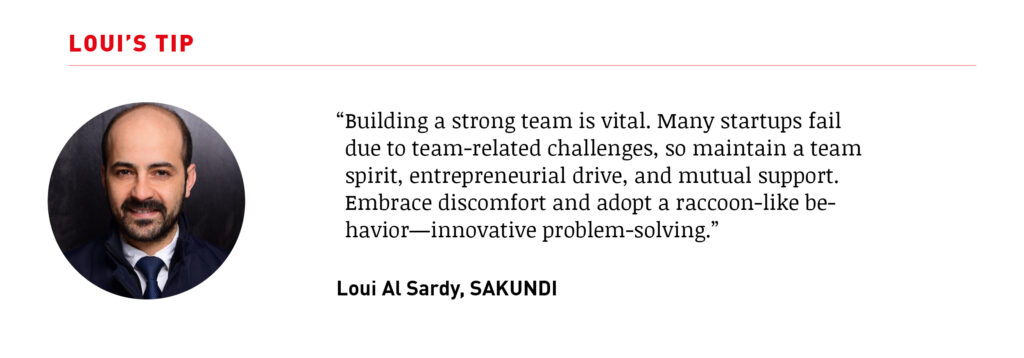
Safer finances with AI: How two researchers work to detect blockchain risks
Written by
Loui Al Sardy and Andres Gomes, the visionary minds behind Sakundi and Young Entrepreneurs in Science 2019 Alumni, share a common goal of transforming the landscape of blockchain technology through AI. Originally from Jordan, Loui’s academic journey led him to Germany, where he immersed himself in computer science before joining the University of Erlangen-Nürnberg as a research and teaching assistant in 2016. Andres, with roots in Colombia, completed a PhD in cybersecurity at the University of Frankfurt and CERN in Geneva. Their business, Sakundi, disrupts traditional banking norms by leveraging blockchain to decentralize trust, offering transparency in transactions with the help of artificial intelligence.
What story brought you here today and made you a sciencepreneur?
Louis: Fueled by an entrepreneurial passion, I embarked on the journey of establishing a startup, drawn to the challenges and uncertainties that define the startup landscape. During my PhD journey, the FAU Digital Tech Fellows Program provided valuable insights into translating ideas and research projects into viable startups. Transitioning from academia to entrepreneurship presented distinct challenges, demanding a shift in approach and acquiring new skills. The challenge is also an opportunity to learn and improve yourself throughout the journey.
Andres: Raising within a family of entrepreneurs in Colombia, I drew inspiration from their ventures. Having worked across various sectors, including NGOs, research laboratories like CERN, and traditional companies, I weighed the pros and cons. Opting for entrepreneurship, I found unparalleled independence, enabling me to live anywhere, engage in impactful work, and pursue science on my terms. The allure of decentralization in the blockchain arena aligned with a cultural shift away from centralization, transcending geographical boundaries. Collaborating with my brother, who resides in Colombia, added a personal touch to our entrepreneurial journey. The fusion of my AI expertise from my PhD and our shared passion for blockchain led us to the inception of Sakundi, bridging the realms of AI and blockchain to address cybersecurity challenges.
How did the YES workshop contribute to Sakundi during the ideation and team-building phase?
A: My choice to be a sciencepreneur is about independence, the freedom to choose your path–even in a culturally decentralized space like blockchain. It’s a departure from the traditional focus on specific regions for innovation.
L: We met via the Young Entrepreneurs in Science Network. We quickly realized that we were working on similar topics in the area of cybersecurity and shared the same dream to start a company. So, we decided to join efforts together to create Sakundi. The Young Entrepreneurs in Science workshop played a pivotal role by bringing us together, despite the distance. It provided valuable skills, connections, and networks. We participated in March 2019, just before the pandemic, and the workshop’s impact is still evident. We remain connected with others from the workshop through the alumni community.

Can you elaborate on what led to the decision for this specific business idea, and how did you form Sakundi? What needs or challenges in your sector influenced this decision?
A: Among various blockchain ideas, we were drawn to transforming centralized processes, especially in areas like finance. While blockchain brings trust, there’s a misconception about its complete security. The distributed nature exposes it to cyber-attacks. We envisioned using AI to monitor blockchain activities, alerting stakeholders to potential threats and vulnerabilities, an area we perceived as unexplored.
L: I’d like to emphasize that in today’s digital world, where everything is interconnected, cybersecurity plays a pivotal role. Blockchain, often misconceived as entirely secure, still maintains vulnerabilities. We recognized the potential of providing security solutions to help companies protect their assets. Additionally, challenges abound for startups, including the need for support, partnerships, and business know-how. We’ve been fortunate to receive funding from the Ethereum Foundation for a research project, which we successfully completed and published. Challenges persist, but we’re on track, nearing completion of our MVP and preparing to reach our first customers. Overcoming these challenges is our ongoing focus.
Moving on to a broader perspective, considering the intersection of AI, quantum computing, and blockchain, what do you perceive as the key security challenges and opportunities?
A: Addressing AI, there’s a growing concern about advanced AI potentially surpassing human control. Discussions revolve around how to manage AI that operates independently and whether we should or can control it. Blockchain, with its focus on trust, is being explored to ensure the reliability of AI outcomes. On the quantum computing front, the speed advantage poses risks to traditional cryptography, prompting research into more robust cryptographic algorithms. We’re in a position similar to the early days of the Internet, where excitement and potential abound. While AI poses risks, it also offers significant potential. For instance, we use AI to protect and secure blockchain applications, contributing to the broader positive impact of these technologies. AI is instrumental in various fields, from medicine to material discovery, making complex tasks more efficient. It might take time to fully grasp the benefits, but the positive aspects are also emerging.
L: Adding to that, these technologies are a double-edged sword. While offering benefits, they pose risks. As users, we must embrace these advancements strategically. In cybersecurity, for instance, at Sakundi, we leverage AI to detect vulnerabilities and fortify company assets. It’s crucial to harness the positive side while being mindful of potential risks. For instance, technologies like ChatGPT rapidly gaining 100 million users in just a few days highlight the need to embrace and leverage these advancements intelligently.
How do you compare your experiences as researchers to your roles as founders? What were the upsides and downsides?
L: Research and entrepreneurship are distinct yet share uncertainties. In research, you aim to solve a defined problem, focusing on finishing a project like a PhD While it offers stability, challenges lie in finding solutions. Entrepreneurship, on the other hand, is akin to raising a baby. It requires constant care, facing financial uncertainties, seeking support, and building trust with partners and customers. Despite challenges, it’s a rewarding journey with valuable skills gained through the iterative process.
A: My PhD involved working on fundamental science for CERN, an environment I loved. However, transitioning from fundamental science to entrepreneurship meant adapting to the fast pace required to create practical solutions. The speed difference between research and entrepreneurship is a significant challenge. In entrepreneurship, there’s a need to move quickly, sustain oneself, and navigate the uncertainties without the support structures seen in research. The team is crucial in entrepreneurship, and the spirit of mutual support is vital for survival and progress.
L: Indeed, team spirit is essential in entrepreneurship. Without our supportive team, especially during the ups and downs, we wouldn’t have reached this point in our startup journey. Effective communication and understanding among team members are crucial for our success.
Now, moving on to the last question. What advice do you have for aspiring sciencepreneurs who want to start their own ventures?
L: At Sakundi, we dream big but take incremental steps. We’re working toward our goals step by step, and hopefully, we’ll achieve success in the cybersecurity sector. Patience is crucial. Similar to completing a PhD, starting a venture requires stepping out of your comfort zone. Take the time to thoroughly define the problem you aim to solve. Concentrate on researching and understanding the customer or user’s pain before seeking solutions. Additionally, building a strong team is vital. Many startups fail due to team-related challenges, so maintain a team spirit, entrepreneurial drive, and mutual support. Embrace discomfort and adopt a raccoon-like behavior—innovative problem-solving.
A: Our team is located in different countries. This openness to individuals beyond borders is crucial, recognizing that opportunities exist globally. Participating in programs like YES is essential for motivation. Completing a PhD might leave you uncertain about applying your research to entrepreneurship, but exposure to diverse research areas and successful examples can inspire confidence. For aspiring entrepreneurs, engage with potential customers early on to understand their needs. This is crucial to ensure that your solution genuinely solves their problems. When seeking funding, clearly communicate why your solution is needed and who will benefit from it. Finally, involvement in entrepreneurial communities provides support, inspiration, and valuable advice.

What happens next?
Check out our event calendar for upcoming workshops. Stay tuned for more updates, opportunities, and success stories!
Connect with Loui and Andres via LinkedIn or visit the website of Sakundi.
Interviewer & Editor: Dilara Ekinci
Illustration: Bengt Xylander
Design & Art Direction: Bianca Cramer






